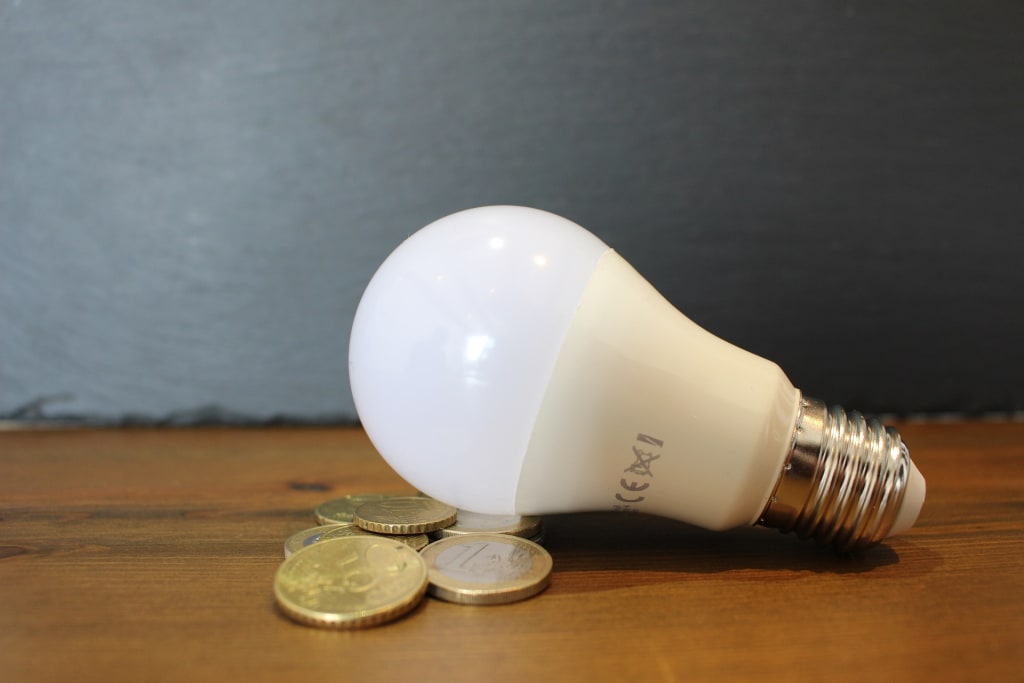Get ready to fork over more cash for electricity!
more cash for electricity

Get ready to fork over more cash for electricity!
In recent years, the price of electricity has been on the rise in many countries around the world. This trend is expected to continue in the coming years, as demand for energy increases and the cost of producing it rises. This means that consumers will have to pay more for their electricity, and businesses will see their operating costs increase.
There are a number of factors driving this trend. First, the demand for energy is growing as the world economy expands. This growth is especially evident in developing countries, where electricity use is increasing rapidly. Second, the cost of producing energy is rising, due to the need to use more expensive fuels and the cost of environmental regulations. Finally, the availability of energy is becoming more constrained, as traditional sources of energy like coal and oil are being depleted.
These trends are likely to have a number of impacts. First, consumers will see their electricity bills increase. This will put pressure on household budgets, and may lead to some people cutting back on their use of electricity. Second, businesses will see their operating costs increase, which will likely be passed on to consumers in the form of higher prices. Finally, the need to find new sources of energy and to conserve existing supplies will become more pressing.
1.Utilities across the country are planning to raise electricity rates
2. The cost of living is already high and rising electricity rates will only add to the financial burden
3. Many families are already struggling to make ends meet and this will only make it harder
4. It's not just the cost of the electricity itself that will go up, but also the cost of the infrastructure to support it
5. This will have a ripple effect on the economy, as businesses will pass on the higher costs to consumers
6. We need to start making changes now to reduce our dependence on electricity
7. There are many things we can do to reduce our electricity use and save money
1.Utilities across the country are planning to raise electricity rates
Utilities across the country are planning to raise electricity rates, which means that consumers will have to fork over more cash to keep the lights on. The average price of electricity is currently about 10 cents per kilowatt hour, but it's expected to jump to 15 cents by the end of the year. The price increase is being driven by a variety of factors, including the rising cost of natural gas, the need to repair and replace aging infrastructure, and government regulations.
While the price of electricity is rising, incomes are not keeping pace. This means that families will have to make choices about how to spend their money, and many will have to cut back on other expenses in order to keep their lights on. In some cases, people may even be forced to choose between buying food and paying their electric bill.
The price increase is also likely to have a ripple effect on the economy, as businesses that use a lot of electricity will pass those costs on to their customers in the form of higher prices. This could lead to inflation, which would further erode the buying power of families and businesses.
The good news is that there are some things that consumers can do to mitigate the impact of the rate increases. For example, energy-efficient appliances and lighting can help reduce electricity consumption, and solar power can provide an alternative to traditional sources of energy. But ultimately, the best way to keep electricity bills under control is to use less power. So, turn off the lights when you leave a room, unplug electronics when they're not in use, and turn down the heat in the winter. By using less electricity, we can all help to keep the lights on while keeping our bills under control.
2. The cost of living is already high and rising electricity rates will only add to the financial burden
The cost of living is already high and rising electricity rates will only add to the financial burden. Many families are struggling to make ends meet and higher electricity rates will only make it harder.
There are a number of reasons why electricity rates are rising. One is that the cost of generating electricity is rising. This is due to a number of factors, including the price of natural gas, which is used to generate electricity. Another reason is that utilities are investing in upgrading their infrastructure, which is also costly.
The rising cost of electricity is a concern for many families and businesses. Families are struggling to pay their bills, and businesses are struggling to maintain their profit margins. Higher electricity rates will only make it harder for families and businesses to make ends meet.
There are a number of ways to reduce the impact of higher electricity rates. One is to use less electricity. This can be done by using energy-efficient appliances and turning off lights when they’re not needed. Another way to reduce the impact of higher electricity rates is to shop around for a better deal. Many utilities offer a variety of rate plans and discounts, so it’s worth taking the time to find a plan that’s right for you.
Despite the challenges, we must find ways to cope with the rising cost of electricity. For many families and businesses, this will be a difficult task. But by using less electricity and shopping around for a better deal, we can minimize the impact of higher electricity rates.
3. Many families are already struggling to make ends meet and this will only make it harder
It's no secret that the cost of living is rising. Families are struggling to make ends meet and the last thing they need is another bill increase. Unfortunately, that's exactly what they're facing with the recent hike in electricity prices.
For many families, the increases will be significant. In some cases, they could be paying hundreds of dollars more per year. This is money that could be going towards other essentials, like groceries or rent. It's a real burden, and one that many families are struggling to cope with.
The government has said that the price hikes are necessary to fund upgrades to the electricity grid. But for families who are already struggling to make ends meet, this just feels like another example of them being asked to sacrifice even more.
There is some relief on the horizon, with the government announcing a package of measures to help families with the cost of living. But it's still not enough. Families are struggling and this price hike is only going to make it harder.
4. It's not just the cost of the electricity itself that will go up, but also the cost of the infrastructure to support it
As we turn to renewable energy sources to power our homes and businesses, it's important to remember that it's not just the cost of the electricity itself that will go up. We also need to factor in the cost of the infrastructure needed to support it.
For example, when we build wind farms, we need to factor in the cost of the turbines, the land they sit on, the roads needed to get to them, and the workers needed to maintain them. All of this costs money, and all of it will be passed onto consumers through higher electricity rates.
In addition, we need to consider the cost of upgrading our existing electrical grid to accommodate renewable energy. This means running new power lines, installing new transformer stations, and making other improvements. Once again, all of these costs will be passed on to consumers.
So, when we talk about the cost of renewable energy, we need to remember that it's not just the cost of the electricity itself that we need to factor in. We also need to consider the cost of the infrastructure needed to support it. All of these costs will be passed on to consumers, so we need to be prepared to pay more for our electricity in the future.
5. This will have a ripple effect on the economy, as businesses will pass on the higher costs to consumers
The cost of electricity is only going to get higher from here. This is because the cost to produce electricity is constantly going up. The price of coal, natural gas, and oil are all on the rise, and there is no end in sight. This will have a ripple effect on the economy, as businesses will pass on the higher costs to consumers.
Inflation will start to rise as businesses raise prices to cover their increased costs. This will cause the average person to have less purchasing power, as their money will not go as far. The cost of living will increase, and people will start to feel the pinch.
The rise in inflation will also lead to higher interest rates. This will make it more expensive to borrow money, and will cause people to cut back on their spending. This will further hurt the economy, as people will have less money to spend.
The higher costs of electricity will also have an impact on job growth. Many businesses will be forced to cut back on their workforce, as they will not be able to afford to pay their employees. This will lead to more people being out of work, and will further hurt the economy.
The only way to avoid all of this is to find alternative sources of energy that are not as expensive. This will be difficult, as many of the best alternative sources are still not economical. However, it is something that must be done if we want to avoid an economic disaster.
6. We need to start making changes now to reduce our dependence on electricity
As climate change continues to be a hot topic worldwide, many people are looking for ways to reduce their dependence on electricity. Here are a few things we can do to start making changes now:
1. Use energy-efficient appliances: Look for the Energy Star label when shopping for new appliances. Energy-efficient appliances use less electricity and can help you save money on your energy bill.
2. Educate yourself and your family about conserving energy: Turn off lights when you leave a room, unplug electronics when they’re not in use, and don’t leave the refrigerator door open for long periods of time.
3. Consider alternative energy sources: Solar panels and wind turbines are becoming more and more popular as people look for ways to reduce their reliance on traditional forms of energy.
4. Advocate for change: Write to your local representatives and let them know that you’re concerned about climate change and that you want them to support policies that will reduce our reliance on fossil fuels.
5. Vote with your wallet: Support businesses that are working to reduce their carbon footprint. When you do your research and buy from companies that are environmentally friendly, you’re sending a message that you care about the planet.
6. We need to start making changes now: We can’t wait for someone else to fix the problem – we need to take action now. Reducing our dependence on electricity is a critical step in combating climate change, and it’s something we can all do to make a difference.
7. There are many things we can do to reduce our electricity use and save money
There are many ways we can reduce our electricity consumption and lower our energy bills. Here are seven tips to get started.
1. Get a smart thermostat: A great way to reduce your energy consumption is to upgrade to a smart thermostat. Smart thermostats can save you up to 30% on your energy bill, so it’s a great way to reduce your carbon footprint as well!
2. Educate your family and friends about conserving energy: One of the best ways to save electricity is to simply educate your loved ones about it! Show them how easy it is save power without making any big changes and see how much of the load they can take off of your shoulders.
3. Unplug your electronics when you’re not using them: If you’re not using your electronics, there’s no need to keep them plugged in. Even if your devices are turned off, they’re still using electricity by being plugged into the wall. So unplug them when you’re not using them and save some energy.
4. Use power strips: Power strips can be a great way to save electricity because you can easily switch off all of your electronics with one flick of a switch. This is especially helpful if you have a lot of devices that you use regularly, like a TV, computer, gaming system, etc.
5. Get energy-efficient appliances: When it’s time to upgrade your appliances, be sure to get energy-efficient models. Energy-efficient appliances use less electricity and can end up saving you a lot of money in the long run.
6. Educate yourself about energy-saving tips: One of the best ways to save electricity is to simply educate yourself about it! There are a ton of great resources out there about saving power. By doing a little research, you can easily find ways to save that you never would have thought of before.
7. Use natural light whenever possible: Whenever possible, try to use natural light instead of electric lights. This can be a great way to save power, especially during the daytime. If you have a lot of windows in your home, take advantage of them and let the sun shine in!
As the weather gets hotter and the demand for electricity increases, so will the price of electricity. So be prepared to pay more for your power this summer.





Comments (1)
You ready for more cash of paying you electricity bill. https://onlinebillexpert.com/